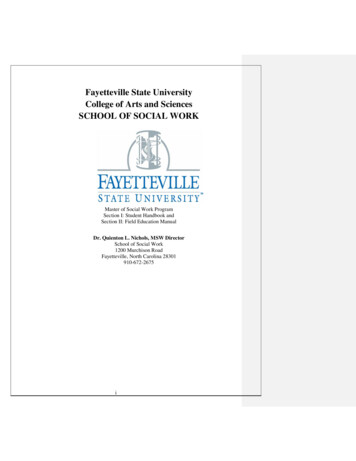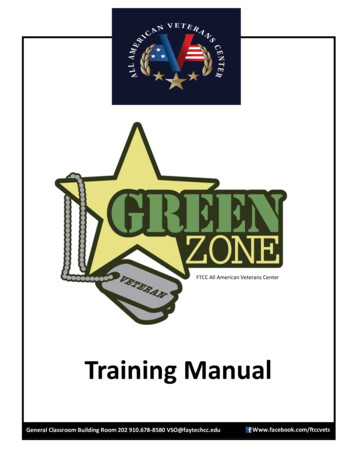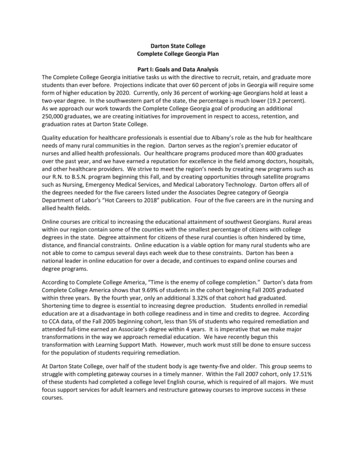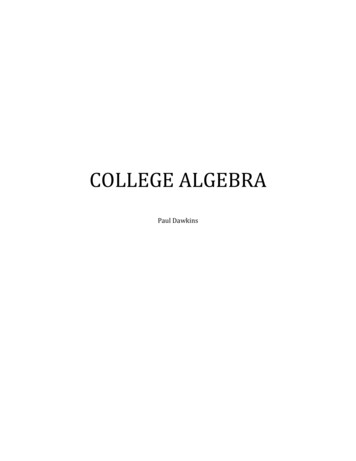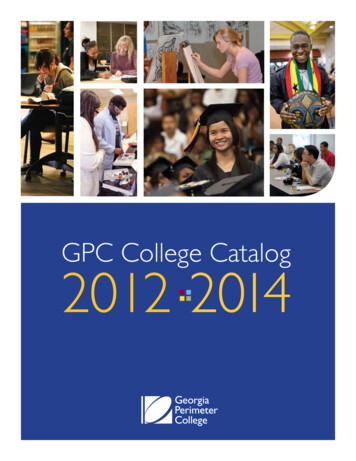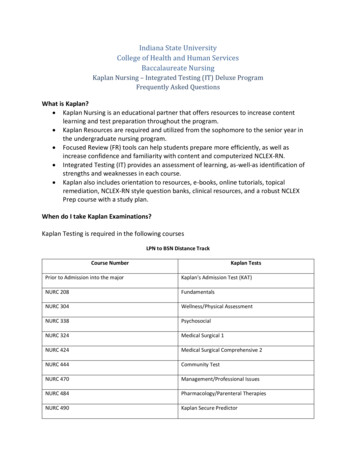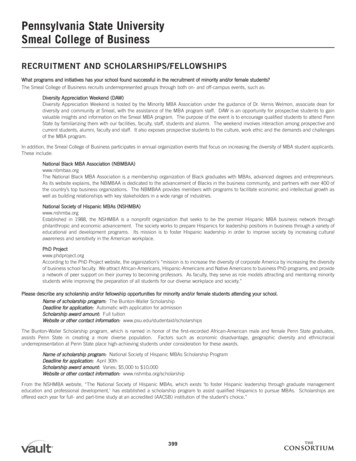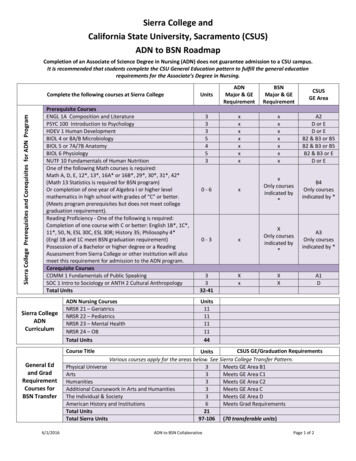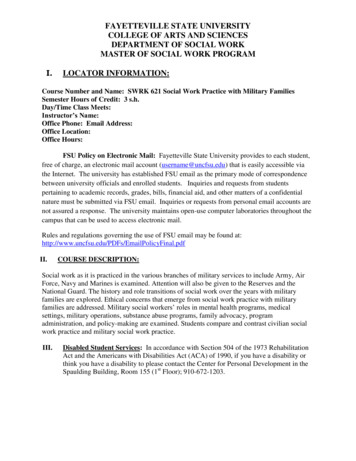
Transcription
FAYETTEVILLE STATE UNIVERSITYCOLLEGE OF ARTS AND SCIENCESDEPARTMENT OF SOCIAL WORKMASTER OF SOCIAL WORK PROGRAMI.LOCATOR INFORMATION:Course Number and Name: SWRK 621 Social Work Practice with Military FamiliesSemester Hours of Credit: 3 s.h.Day/Time Class Meets:Instructor’s Name:Office Phone: Email Address:Office Location:Office Hours:FSU Policy on Electronic Mail: Fayetteville State University provides to each student,free of charge, an electronic mail account (username@uncfsu.edu) that is easily accessible viathe Internet. The university has established FSU email as the primary mode of correspondencebetween university officials and enrolled students. Inquiries and requests from studentspertaining to academic records, grades, bills, financial aid, and other matters of a confidentialnature must be submitted via FSU email. Inquiries or requests from personal email accounts arenot assured a response. The university maintains open-use computer laboratories throughout thecampus that can be used to access electronic mail.Rules and regulations governing the use of FSU email may be found II.COURSE DESCRIPTION:Social work as it is practiced in the various branches of military services to include Army, AirForce, Navy and Marines is examined. Attention will also be given to the Reserves and theNational Guard. The history and role transitions of social work over the years with militaryfamilies are explored. Ethical concerns that emerge from social work practice with militaryfamilies are addressed. Military social workers’ roles in mental health programs, medicalsettings, military operations, substance abuse programs, family advocacy, programadministration, and policy-making are examined. Students compare and contrast civilian socialwork practice and military social work practice.III.Disabled Student Services: In accordance with Section 504 of the 1973 RehabilitationAct and the Americans with Disabilities Act (ACA) of 1990, if you have a disability orthink you have a disability to please contact the Center for Personal Development in theSpaulding Building, Room 155 (1st Floor); 910-672-1203.
IV.REQUIRED TEXTS:Martin, J. A., Rosen, L. N.; & Sparacino, L. R. (Eds.). (2000). The military family: A practiceguide for human service providers. Westport, Connecticut: Praeger.Basham, Kathryn (Ed.). (2009). Smith College Studies in Social Work (Special Issue-CombatStress: Understanding the Challenges, Preparing for the Return) Vol. 79, Nos. 3-4.SUPPLEMENTAL TEXTSDaley, J.G. (Ed.) (1999). Social work practice in the military. New York: Haworth Press.Booth, Bradford; Segal-Wechsler, Mandy, and Bell, D. Bruce (Eds.). (2007). What we knowabout military families. Washington, D.C.: FMWR Command and ICF International.SELECTED INTERNET SOURCESAir Force bmittedFileView?file air force-links.htmArmy National Guard Readiness Program:http://www.arng.army.mil/soldier resources/default.asp?id 37Army Community aspFamily Advocacy Program:http://www.bragg.army.mil/dv/Military Family Resource Center:http://www.mfrc-dodqol.org/Military Spouse Resource Center:http://www.milspouse.org/National Military Family gename page not foundMilitary Family orth Carolina National Guard:http://www.nc.ngb.army.mil/default.asp
V.COURSE OBJECTIVESUpon completion of this course, students will be able to:1. Articulate understanding of the historical development of military social work.2. Describe the influence of social work values and ethics on social work with the military.3. Demonstrate an understanding of social issues in military families. Examples of issuesinclude substance abuse, domestic violence, poverty, depression, divorce, childmaltreatment, and sexual orientation.4. Examine patterns of military social work policies and service provision as related to childwelfare, family services, adult services, mental health, substance abuse and health care.5. Critically evaluate the social work profession and military social workers’ roles in theformulation and implementation of policy.6. Analyze social issues in the military pertaining to discrimination and oppression as theyrelate to social and economic injustice, racism, sexism, classism, homophobia, and ageism.VI.COURSE OUTLINEThis schedule is subject to change as needed throughout the semester.SessionsTopics1Military Lifeand Culture2Challenges ofMilitary Life356ReadingsChapter 18 Understanding the Military as an EthnicIdentity (Daley)Chapter 1 Today’s Active Duty Military Family(Martin, et. Al)Chapter 4 Coping with the Unique Demands ofMilitary Life (Martin, et.al)Chapter 13 Understanding Life in the Army:Military Life from a Service Member and FamilyMember Perspective (Daley)Enlisted Soldiers Chapter 3 The Special Case of the Young EnlistedFamily (Martin, et. al)Chapter 2 Characteristics of Army Families andArmy Life (Booth, et. al)Chapter 7 Informal and Formal Social Support ofArmy Families (Booth, et. al)HistoricalChapter 5 Well-Being Within Army FamiliesDevelopment of (Booth, et. al)Military SocialChapter 1 History of Army Social Work (Daley)WorkChapter 3 History of Air Force Social Work (Daley)Social WorkPractice in TheSpeakers
7Military Cont.Social WorkPractice in theMilitary Cont.8Deployment andWar9FamilyAdjustmentsBefore andFollowingDeployment10Citizen Soldiers11DomesticViolence dren14MilitaryRetirement andLife TransitionsChapter 9 The Role of the Social Work Officer inSupport of Combat and Noncombat Operations(Daley)Utilizing Social Support to Conserve the FightingStrength: Important Considerations for MilitarySocial Workers J. Camille Hall (Basham, P. 335)Impact of Combat on the Mental Health and WellBeing of Soldiers and Marines Colonel Carl Castor(Basham, P. 247)Chapter 8 Wartime Stress and Family Adaptation(Martin, et. al)Chapter 9 Providing Support During MilitaryDeployments (Martin, et. al)Secondary Trauma and Military Veteran CaregiversBrian E. Bride and Charles R. Figley (Basham, P.314)Chapter 10 Marital Adjustment FollowingDeployment (Martin, et. al)Chapter 17 Working with Military Families DuringDeployment (Delay)Rising to the Challenge of Treating OEF/OIFVeterans with Co-occurring PTSD and SubstanceAbuse Alan Bernhardt (Basham, P. 344)Chapter 2 The Citizen-Soldier and ReserveComponent Families (Martin, et. al)Chapter 4 Unique Issues for Reserve Component(RC) Soldiers and Families (Booth, et. al)Families: “They also Serve Who Only Stand andWait” Jaine Darwin (Basham, P. 433)Chapter 4 Development and Evolution of the FamilyAdvocacy Program in the Department of Defense(Daley)Chapter 11 Understanding Spouse Abuse in MilitaryFamilies (Martin, et. al)Chapter 12 Responding to Child MaltreatmentInvolving Military Families (Martin, et. al)Chapter 6 Children in Army Families (Booth, et. al)The Legacy of War: An IntergenerationalPerspective Barbara Leiner (Basham, P. 375)Chapter 15 The Strengths and Vulnerabilities ofAdolescents in Military Families (Martin, et. al)Chapter 16 Beyond Adolescence: The Experiencesof Adult Children of Military Parents (Martin, et. al)Chapter 7 Military Retirement and the Transitions toCivilian Life (Martin, et. al)Chapter 17 Afterword: The Changing Nature ofMilitary Service and Military Family Life (Martin,et. al)
15EthicalDilemmasconfronted byMilitary SocialWorkersPolicy PaperPresentations16VII.Chapter 10 The Role of Social Work in PolicyPractice (Daley)Chapter 11 Common and Unique Ethical DilemmasEncountered by Military Social Workers (DaleyASSIGNMENTSOne Book Report (20% of grade)The book report provides students an opportunity to upgrade their knowledge and skills, as wellas prepare for lifelong learning. Students will select one book form the attached bibliography, andin a typed three-page paper address the following: Summarization of bookAnalyze the content and arguments presented in the bookWhat questions did you have about the information that was presented to you?How did you go about obtaining answers to your questions, and what answers did youfind?After obtaining your answers, what are your conclusions?Discuss str4engths and limitations of contentDiscuss assumptions and implications for social work practice with military families?Policy Paper (60% of grade)Students will broaden their knowledge of the complexity of policies addressing military issues,ads well as a concern in social work practice. Research selected policy by utilizing a policyanalysis model and address the following in an eight to ten page typed paper relating to: Historical background of policyDescription of problem that necessitated the policyDescription of policyPolicy analysisDiscuss if the policy supports populations at risk, and social and economic justice.Include in your discussion intended and unintended consequences of policyimplementations. Address appropriate constituencies, theorist, service providers,clients/consumers, activists, lobbyist, and decision makers; and social and cultural factorsinfluencing policy development.Military/Civilian Agency Visitations (20% of grade)The purpose of this assignment is to develop students’ understanding of military agency roleswithin the community as well as enhance their knowledge of prevention and interventionprograms.
You are to visit two social military agencies serving different populations (i.e. adults, women,adolescents, public, private, etc.). Provide a summary of your experiences and your impressionsof the facility you visited.Examples of Agencies and Military BasesArmy Community ServicesFort Bragg Advocacy ProgramChaplainsVA Medical CenterFayetteville Vet CenterVeteran’s Service OfficeWomack Army Medical CenterPope Air Force Base Social ServicesRed CrossSeymour Johnson Air Force BaseCivilian AgenciesDepartment of Social ServicesCumberland County Mental HealthCumberland County Health DepartmentVIII.EVALUATION CRITERIA:a. Comprehensiveness in addressing assignments outlineb. Neatness, grammar, spelling and sentence structurec. APA Format (if applicable)Papers with severe misspelling and poor grammar will be returned to students. Students will beexpected to correct errors and submit paper back to the instructor. If paper is returned to student,the highest grade student may receive is a “B”.Grading Scale:A90-100B80-89C70-79Below 70ExceptionalAbove AverageAverageAcademic FailureA grade of A represents work which is of outstanding quality, well-researched, or unusuallyinsightful; B work is that which is thoughtful and above the group average; C work meets butdoes not exceed expectations; Below 70 work is inadequate, incomplete, poorly organized andpresented, or shows evidence of little thought or integration of concepts.Policy on DisabilitiesAny student with a documented disability condition who needs to arrange accommodations mustcontact the Center for Personal Development; 114 Collins Administration Building. The phonenumber is (910) 672-1204.Attendance and Participation Policy
Class time is limited and much will be done every class period. Lectures, class discussions,presentations and group project decisions are all important. Class attendance and participationmean students will come to class having read the assigned materials and being prepared todiscuss them. Regular and punctual class attendance is essential to the enhancement of studentperformance. Absences beyond three may result in a reduction in students’ attendance andclassroom participation grade. A class attendance and participation grade of zero may be givenfor three or more absences. If students are absent for any reason, it is their responsibility to findout from other students what they have missed.Course ExpectationsStudents are responsible for all material assigned and discussed in the course. Students areexpected to submit their assignments in a timely manner. Late submission of assignments willreceive a letter grade reduction per day, (day count includes weekends). Students are expected tocomplete assigned readings and review web sites prior to class to promote participation inclassroom discussions. Students are expected to participate in classroom discussions and groupexercises. All students are required to have an e-mail address. Cellular phones and beepers arenot allowed to be turned on or used during class time. ACCORDING TO UNIVERSITYPOLICY VISITORS AND CHILDREN ARE NOT ALLOWED IN CLASS.IX.ACCESSING THE WEB ENHANCED COURSE ON BLACKBOARDStudents enrolled in SWRK 621 Social Work Practice with Military Families during the semesterwill have access to this web-enhanced course on Blackboard. Students will have access tosyllabus, handouts, related websites, and chat rooms.X.TEACHING STRATEGIESTeaching strategies will include a combination of lectures, multi-media presentations, computerapplications, classroom discussions, group work, classroom exercises, Blackboard, and studentpresentations.XI.ACADEMIC SUPPORT SERVICES1. The University College Learning Center is open for computer use. It is located in theHelen T. Chick Building.2. There is also assistance for Supplementary Instruction n writing. This department is alsolocated in the Helen T. Chick Building. Please contact them at (910) 672-1864 to makean appointment or inquire about their services.3. Smartthinking: www.smartthinking.com/static/colleges - online tutorial and onlinewriting labOther services are listed and described on the FSU Office of Student Affairs website.
FSU Policy on Electronic Mail: Fayetteville State University provides to each student, free of charge, an electronic mail account (username@uncfsu.edu) that is easily accessible via the Internet. The university has established FSU email as the primary mode of correspondence between university officials and enrolled students.
